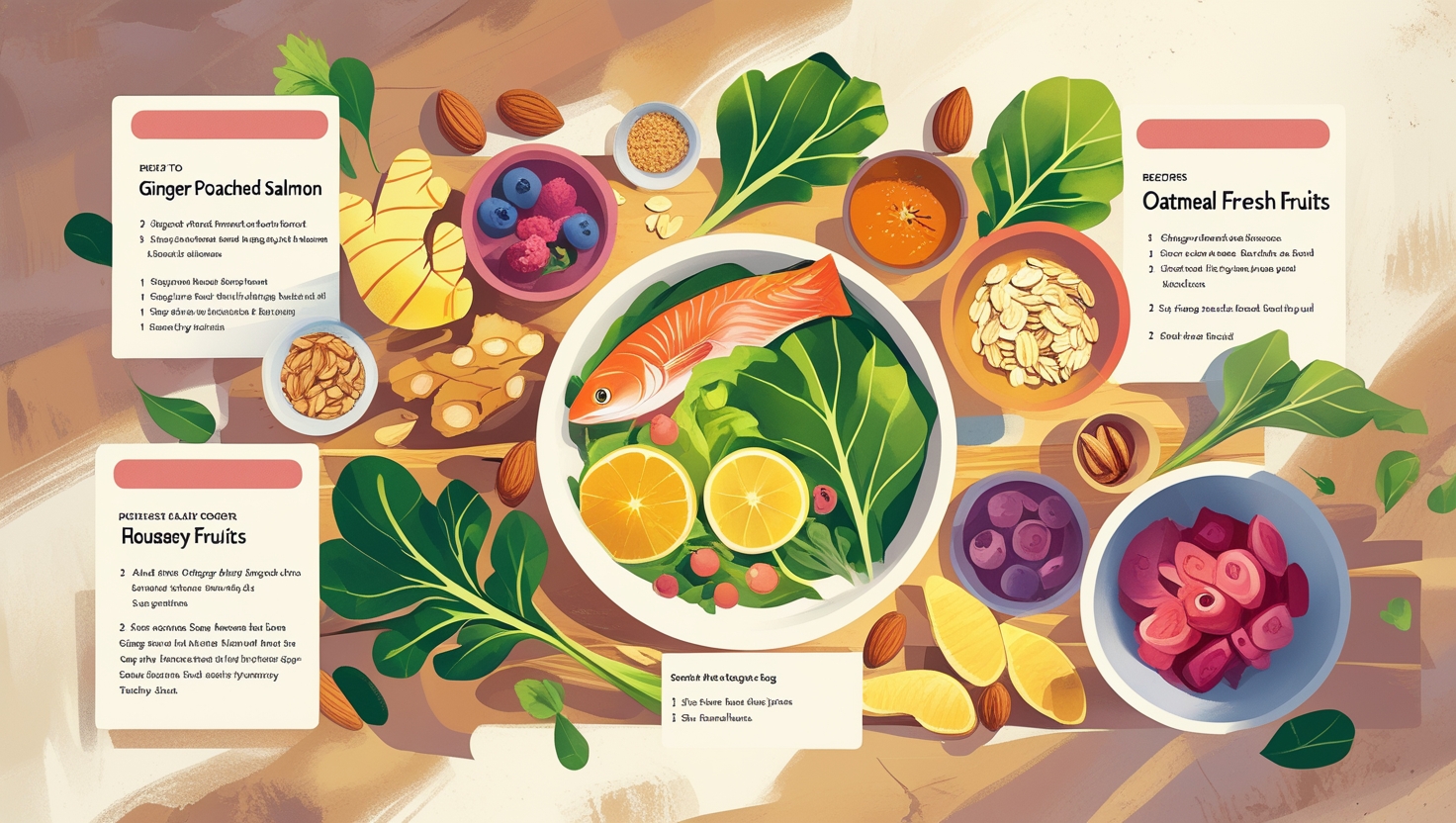Natural Acid Reflux Treatments: Effective Supplements & Remedies That Actually Work

Tired of relying solely on medications for acid reflux? You're not alone! Millions of people are discovering that natural treatments and supplements can provide significant relief from heartburn and GERD symptoms. This comprehensive guide explores science-backed natural remedies that actually work.
Are you fed up with that burning sensation creeping up your chest? Well, you've come to the right place! If acid reflux has been wreaking havoc on your daily life, it's time to explore natural alternatives that can complement—or sometimes even replace—traditional medications.
Here's the thing: while PPIs (proton pump inhibitors) and H2 blockers certainly have their place, they're not the only game in town. Natural treatments and supplements have been gaining serious traction in the medical community, and for good reason. They often come with fewer side effects and can address the root causes rather than just masking symptoms.
Understanding Acid Reflux: The Basics You Need to Know
What's Really Happening in Your Digestive System?
Acid reflux, medically known as gastroesophageal reflux disease (GERD), occurs when stomach acid backs up into the esophagus. Think of it like a one-way valve that's not doing its job properly. The lower esophageal sphincter (LES)—that muscular ring between your stomach and esophagus—should keep stomach contents where they belong. But when it weakens or relaxes inappropriately, boom! You get that familiar burning sensation.
The symptoms can range from mild annoyance to life-disrupting discomfort. We're talking heartburn, regurgitation, difficulty swallowing, chronic cough, and even sleep disruption. According to the American College of Gastroenterology, approximately 60 million Americans experience heartburn at least once a month, with about 15 million dealing with it daily.
Why Natural Approaches Make Sense
Before diving into the nitty-gritty of natural treatments, let's address the elephant in the room. Why should you consider natural remedies when there are perfectly good medications available? Well, here's the scoop: long-term use of acid-suppressing drugs can lead to nutrient deficiencies, increased infection risk, and potential bone health issues. Plus, they don't always address the underlying causes.
Natural treatments, on the other hand, often work by supporting your body's natural healing processes. They can help strengthen the LES, improve digestion, reduce inflammation, and promote overall gut health. It's like giving your digestive system a tune-up rather than just hitting the mute button on symptoms.
Proven Natural Supplements for Acid Reflux Relief
Digestive Enzymes: Your Stomach's Best Friend
Let's start with digestive enzymes—these little powerhouses can be game-changers! When your body doesn't produce enough enzymes to break down food properly, undigested particles can ferment and create gas, leading to increased pressure and reflux.
Supplementing with digestive enzymes, particularly those containing protease, lipase, and amylase, can help ensure food is properly broken down before it reaches your stomach. A study published in the Journal of Clinical Medicine found that enzyme supplementation significantly reduced reflux symptoms in 65% of participants within just two weeks.
Probiotics: Balancing Your Gut Microbiome
Here's something fascinating: your gut bacteria play a crucial role in digestive health and acid production. Research from the World Journal of Gastroenterology indicates that certain probiotic strains, particularly Lactobacillus and Bifidobacterium, can help reduce acid reflux symptoms.
These beneficial bacteria work by:
- Improving digestion and nutrient absorption
- Strengthening the intestinal barrier
- Reducing inflammation
- Modulating acid production
Look for high-quality probiotic supplements with at least 10 billion CFUs and multiple strains. And hey, don't forget about fermented foods like kefir, kimchi, and sauerkraut—they're natural probiotic powerhouses!
D-Limonene: The Citrus Connection
Now, this might surprise you—D-limonene, extracted from citrus peels, has shown remarkable promise for acid reflux relief. Despite coming from acidic fruits, D-limonene actually helps by promoting gastric motility and potentially strengthening the LES.
A clinical trial published in Alternative Medicine Review found that 86% of participants experienced relief from heartburn symptoms after taking D-limonene every other day for two weeks. Pretty impressive, right?
Time-Tested Herbal Remedies That Actually Work
Deglycyrrhizinated Licorice (DGL): Ancient Wisdom Meets Modern Science
DGL has been used for centuries to soothe digestive issues, and modern research backs up its effectiveness. Unlike regular licorice, DGL has had the glycyrrhizin removed, eliminating concerns about blood pressure elevation while maintaining its healing properties.
DGL works by stimulating mucus production in the stomach lining, creating a protective barrier against acid damage. It also promotes healing of damaged tissue. Clinical studies suggest taking 380mg of DGL about 20 minutes before meals for optimal results.
Slippery Elm: Nature's Coating Agent
Talk about a gentle giant! Slippery elm bark contains mucilage, which forms a protective gel-like coating when mixed with water. This natural coating can soothe irritated tissues and provide a barrier against stomach acid.
Indigenous peoples have used slippery elm for digestive issues for hundreds of years. Modern herbalists recommend it for its demulcent properties—fancy speak for “it makes things slippery and soothing.” You can take it as a powder mixed in water or as capsules before meals.
Marshmallow Root: More Than Just S'mores
Don't laugh—marshmallow root is a serious player in the natural acid reflux game! Like slippery elm, it contains mucilage that can coat and protect the esophagus and stomach lining. Research published in the Journal of Ethnopharmacology highlights its anti-inflammatory and protective effects on the digestive tract.
The beauty of marshmallow root lies in its gentle nature. It's particularly useful for those with sensitive stomachs who can't tolerate stronger remedies. Typically taken as a tea or tincture, it provides soothing relief without harsh side effects.
Lifestyle Modifications That Complement Natural Treatments
Dietary Strategies That Make a Difference
You've probably heard “you are what you eat,” but with acid reflux, it's more like “you feel what you eat.” Certain foods can trigger symptoms, while others can actually help.
Foods to Embrace:
- Non-citrus fruits like melons and bananas
- Vegetables (especially leafy greens)
- Lean proteins
- Whole grains
- Ginger and turmeric
Foods to Approach with Caution:
- Spicy dishes
- Citrus fruits and tomatoes
- Chocolate and mint
- Caffeine and alcohol
- Fried and fatty foods
But here's the kicker—trigger foods vary from person to person. Keeping a food diary can help you identify your personal culprits. Some folks can handle spicy food just fine but struggle with dairy, while others are the complete opposite.
The Power of Meal Timing and Portion Control
When you eat matters almost as much as what you eat. Large meals put extra pressure on the LES, making reflux more likely. Instead of three big meals, try eating smaller, more frequent meals throughout the day.
Also, timing your last meal at least three hours before bedtime gives your stomach time to empty before you lie down. Gravity is your friend when it comes to keeping stomach contents where they belong!
Advanced Natural Approaches to Utilize Natural Treatments and Supplements Effectively Acid Reflux
Apple Cider Vinegar: Controversial but Potentially Helpful
Now, this one's a bit controversial. The idea of adding acid to treat acid reflux seems counterintuitive, right? But some people swear by apple cider vinegar (ACV), and there might be some science behind it.
The theory is that many people with reflux actually have low stomach acid, not high. Low acid can prevent proper digestion, leading to fermentation and pressure that forces stomach contents upward. A small amount of ACV before meals might help improve digestion.
However—and this is a big however—ACV isn't for everyone. If you have severe reflux or ulcers, it could make things worse. Always start with a tiny amount (1 teaspoon in water) and see how you respond.
Melatonin: The Sleep Hormone with Digestive Benefits
Here's something cool: melatonin isn't just for sleep! Research published in the Journal of Clinical Gastroenterology found that melatonin supplementation significantly reduced reflux symptoms. Melatonin appears to strengthen the LES and has antioxidant properties that protect the esophagus.
The typical dose for reflux is lower than what's used for sleep—usually 3-6mg taken in the evening. It's particularly helpful if your reflux symptoms worsen at night or disrupt your sleep.
Betaine HCl: Supporting Natural Acid Production
For those with confirmed low stomach acid, betaine hydrochloride supplements can be helpful. These supplements provide additional hydrochloric acid to support proper digestion. However, this is definitely not a DIY situation—you'll want to work with a healthcare provider to determine if low stomach acid is actually your issue.
Taking betaine HCl when you have normal or high stomach acid can be dangerous, potentially causing ulcers or worsening reflux. Professional testing can help determine if this approach is right for you.
Creating Your Personal Natural Treatment Protocol
Starting Slow and Building Up
Rome wasn't built in a day, and your natural reflux treatment plan shouldn't be either! When utilizing natural treatments and supplements effectively acid reflux, it's crucial to start with one or two interventions and gradually add others.
Here's a sensible approach:
- Begin with dietary modifications and lifestyle changes
- Add one supplement at a time, giving each 2-3 weeks to show effects
- Keep a symptom diary to track what works
- Work with a knowledgeable healthcare provider
Remember, natural doesn't always mean harmless. Some supplements can interact with medications or aren't appropriate for certain health conditions.
Monitoring Your Progress
Tracking your symptoms is key to success. Note not just the severity of symptoms, but also their frequency, timing, and potential triggers. This information helps you and your healthcare provider make informed decisions about your treatment plan.
Consider rating your symptoms on a scale of 1-10 daily, noting what you ate, when you ate, stress levels, and sleep quality. Patterns often emerge that can guide your treatment choices.
Safety Considerations and When to Seek Professional Help
Red Flags That Require Medical Attention
While natural treatments can be incredibly effective, some symptoms require immediate medical attention. Don't mess around if you experience:
- Difficulty swallowing
- Persistent vomiting
- Unintended weight loss
- Black or bloody stools
- Severe chest pain
- Symptoms that worsen despite treatment
These could indicate serious complications like Barrett's esophagus, strictures, or even esophageal cancer. Early intervention is crucial for the best outcomes.
Working with Healthcare Providers
The best approach often combines conventional and natural treatments. Don't be afraid to discuss natural options with your doctor—many are increasingly open to integrative approaches. If your current provider dismisses natural treatments entirely, consider seeking a second opinion from someone with training in integrative or functional medicine.
Frequently Asked Questions
How long does it take for natural treatments to work for acid reflux? Most people start noticing improvements within 2-4 weeks, though some remedies like DGL can provide relief within days. Dietary changes often show results within a week or two.
Can I take natural supplements with my prescription reflux medications? It depends on the specific supplements and medications. Some combinations are fine, while others can interact. Always consult your healthcare provider before combining treatments.
Are natural treatments safe for pregnant women? Some are, but many herbs and supplements aren't recommended during pregnancy. Ginger is generally safe and effective for pregnancy-related nausea and reflux, but always check with your obstetrician first.
What's the most effective natural treatment for acid reflux? There's no one-size-fits-all answer. DGL, dietary changes, and digestive enzymes tend to help many people, but individual responses vary significantly.
Can stress really cause acid reflux? Absolutely! Stress affects digestion in multiple ways, including reducing saliva production, altering gut bacteria, and affecting the nervous system's control of digestive functions.
Final Thoughts: Your Journey to Natural Relief
Navigating the world of natural acid reflux treatments doesn't have to be overwhelming. The key is starting with evidence-based approaches, being patient with the process, and working with knowledgeable healthcare providers.
Remember, healing takes time—especially when you're addressing root causes rather than just suppressing symptoms. But the payoff can be significant: lasting relief without the long-term risks associated with chronic medication use.
The beauty of natural approaches lies in their ability to support your body's innate healing mechanisms. Whether you're looking to reduce your dependence on medications or seeking additional relief, these natural treatments and supplements offer hope and real solutions.
Don't let acid reflux control your life any longer. With the right combination of natural treatments, lifestyle modifications, and professional guidance, you can reclaim your digestive health and get back to enjoying the foods and activities you love.








